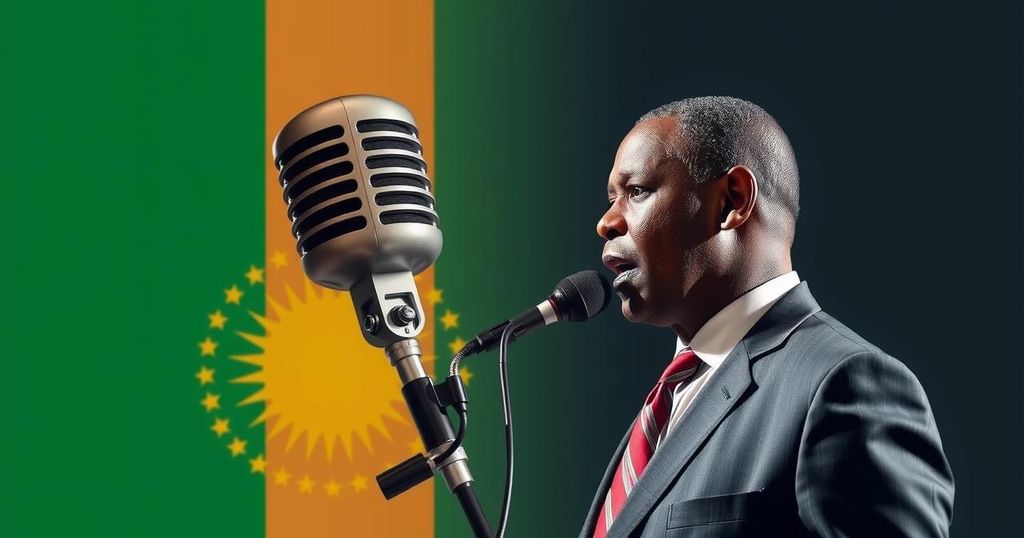Namibia Votes in Presidential Election with Potential for First Female Leader
On November 27, 2024, Namibia votes in its presidential election, with vice president Netumbo Nandi-Ndaitwah leading as a contender to become the country’s first female leader. The ruling SWAPO party, facing criticism over rising unemployment and economic challenges, must navigate a shifting political landscape. Approximately 1.4 million voters are registered, and other candidates, including Panduleni Itula, will also compete, complicating SWAPO’s long-standing hold on power.
Namibia is currently experiencing a pivotal moment as it casts votes in its presidential election on November 27, 2024. The country is witnessing a historic opportunity with Netumbo Nandi-Ndaitwah, the 72-year-old vice president and candidate from the ruling SWAPO party, in contention to potentially become Africa’s first female leader. Early voting results have indicated her strong front-runner status. Nonetheless, the SWAPO party is grappling with increasing dissent due to economic difficulties and high unemployment rates, particularly among the youth, posing a considerable challenge in securing electoral victory.
Despite having held the presidency for 34 years since Namibia’s independence in 1990, SWAPO’s popularity appears to be declining. This trend is reflective of analogous political shifts in other southern African nations, where established parties have faced unprecedented electoral defeats this year. Voter registration stands at approximately 1.4 million, representing nearly half the nation’s population, underscoring the importance of these elections for the country’s future governance.
The electoral landscape is not limited to Nandi-Ndaitwah, as fourteen other candidates are vying for the presidency, including former dentist Panduleni Itula, who was SWAPO’s primary challenger in the last election cycle. Presently, if no candidate achieves over 50% of the vote, which has never occurred in Namibia, a runoff election would ensue. The political context has shifted dramatically following the death of President Hage Geingob in February, leaving his vice president, Nangolo Mbumba, to lead the country temporarily.
Nandi-Ndaitwah’s campaign is centered around promises of economic reform, pledging to generate over 500,000 jobs and address significant issues impacting women’s rights and healthcare. Given that Namibia possesses a sparse population within its vast territory, how voters prioritize these issues will significantly impact the election’s outcome.
As Namibia stands at this electoral crossroads, the world watches closely, marking a significant event not just for the nation but potentially for women’s leadership representation across Africa.
Historically, Namibia has been governed by the SWAPO party since its independence from South African rule in 1990. Despite its long-standing presence in Namibian politics, recent economic challenges, including high unemployment rates particularly among the youth, have incited public discontent. Netumbo Nandi-Ndaitwah, representing a pivotal change, could become the country’s first female president, which is significant amid a broader regional trend of political shifts toward new leadership. Voter mobilization in this context is critical, with growing attention to social issues affecting various demographics, notably women. The context of these elections is compounded by the unexpected passing of President Hage Geingob earlier in the year, and the implications of his leadership and the current political atmosphere are pivotal in shaping voter sentiment. The electoral dynamics also include the possibility of unprecedented runoff elections should the majority threshold not be achieved by any candidate, which could reshape Namibia’s political landscape markedly. The demographic profile of Namibia, characterized by a low population density in relation to its geographical size, further emphasizes the electoral stakes as parties seek to connect with diverse voter groups across the nation.
The 2024 Namibian presidential election represents a monumental opportunity with Netumbo Nandi-Ndaitwah poised to potentially break the gender barrier in political leadership within the country. Amid increasing social and economic pressures influencing voter sentiment, the ruling SWAPO party faces significant challenges to its historical dominance. With approximately half the population registered to vote, the election will determine the trajectory of Namibian governance and address urgent issues like unemployment and women’s rights. As the nation votes, the anticipation surrounding this election reflects broader regional changes in governance throughout southern Africa.
Original Source: apnews.com




Post Comment